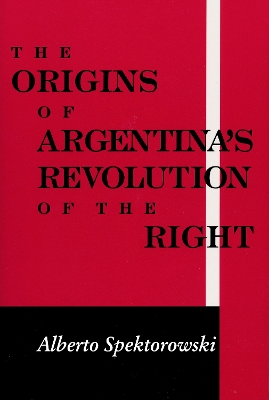Kellogg Institute Series on Democracy and Development
1 total work
The Origins of Argentina's Revolution of the Right traces the ideological roots and political impact of Argentine right-wing nationalism as it developed in the 1930s and 1940s. In this spirited book, Alberto Spektorowski focuses on the attempt by a new brand of nonconformist intellectuals to shift the concept of Argentine nationalism from its liberal incarnation to an integralist-populist one and, simultaneously, to change Argentina's path of development from liberalism to a "third road" of economic autarky.Spektorowski maintains that the "third road" developed in 1930s Argentina through the juxtaposition of two apparently opposing types of anti-liberal ideological currents: a right-wing authoritarian current reliant upon counterrevolutionary European sources, and an anti-imperialist, populist current. He shows that both of these wings rejected liberal institutions, bourgeois society, cosmopolitanism, and old-type conservatism, and became profoundly anti-imperialist. Both defended a "pro-Axis" neutrality during World War II, and both set the ideological stage for Argentina's sociopolitical shift of the 1940s. Spektorowski concludes that both of these currents produced a single nationalist ideology that became the intellectual framework in which the "repertoire" of political values of the 1943 military regime and Peronism was subsequently elaborated.
